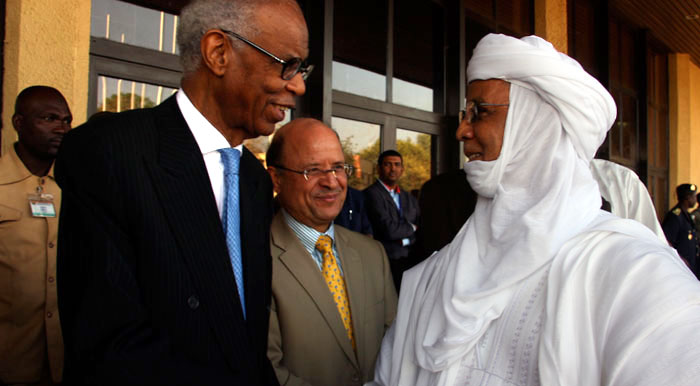
The complex problems of the Sahel-Sahara region were discussed by high-level representatives from the African Union, the United Nations, the European Union, regional governments, and experts at a seminar in Niger organized jointly by the International Peace Institute, the government of Niger, and the Centre for Strategies and Security for the Sahel Sahara (Centre 4S).
The International Seminar on Security and Development in the Sahel-Sahara was convened February 15-16, 2013 in Niamey, and was held with support from President Issoufou Mahamadou of Niger, and presided over by Niger’s prime minister, Brigi Rafini. It featured experts such as Youssef Mahmoud, senior advisor at the International Peace Institute, and Ahmedou Ould Abdallah, president of the Mauritania-based Centre4S.
The seminar took place at a particularly troubled time for the Sahel-Sahara region, which is facing numerous security, stability, and development challenges. The acceleration and worsening of the crisis in Mali hastened a military response initiated by France upon the West African country’s request. This situation also sped up the deployment of the African-led International Support Mission in Mali (AFISMA) under the auspices of the Economic Community of West African States (ECOWAS) and the African Union.
The meeting aimed to deepen understanding of the multiple dimensions of the crisis in the Sahel-Sahara, identify elements that could be included in the integrated strategy for the Sahel, and improve international cooperation and coordination.
Though the situation in Mali has captured everyone’s attention, the entire Sahel-Sahara region, and to a certain extent the Maghreb and West Africa, are characterized by several vulnerabilities, fragilities, and drivers of conflict.
The fragility and failure of some states in this region is illustrated by their inability to ensure an effective and efficient presence and control over their entire national territory and to meet their populations’ basic needs, notably those living in remote areas.
Such a situation largely contributed to the development of a flourishing transnational criminal economy with various forms of trafficking, including drug and arms trafficking, and a new kidnapping industry.
The persistent terrorist threat, despite the current international military response in Mali, calls for urgent, effective, and integrated action by countries in the region, as well as by the international community.
The seminar also noted additional factors that could provide fertile ground for a criminalized economy, radicalism, and terrorism: the lack of economic opportunities, perceptions of exclusion, injustice and abandonment, non-respect for human rights, poor governance, local populations’ weak participation, and unequal redistribution of resources. Nevertheless, it was acknowledged that poverty alone could not be considered the main cause or driver of insecurity, particularly of terrorism.
The international seminar further highlighted the weakness of regional cooperation in addressing both security and development challenges.
The seminar noted the importance of engaging local collectivities, civil society organizations, and the general public—notably women and youth—to facilitate their full participation in addressing security and development issues in the region.
In this regard, it was agreed that a dialogue between policymakers and civil society organizations must be developed and strengthened.
The seminar acknowledged that most of the vast economic potential of most Sahelian countries remains underexploited. In these countries, the state also proves to be the main generator of wealth, monopolizing almost all national resources.
The seminar therefore highlighted the need for an increased and stronger role for the private sector as a driver and provider of growth and employment in order to turn sustainable security and development into a reality.
The seminar noted the disconnect between think tanks and research institutes and decision-making centers in the region. It was therefore suggested that think tanks should form a network so that they could serve as a creative force for decision-makers and development stakeholders.
The seminar underlined the need to put member states from the region at the heart of the definition and implementation of development and security strategies, with the international community assisting them.
Finally, on international coordination and cooperation, the seminar noted recurring gaps in carrying out common analysis, reaching a shared understanding of security and development challenges, and providing effective responses to these challenges. It further encouraged countries from the region to strengthen their cooperation in order to build on all relevant experiences in efforts to fight terrorism and organized crime.
The seminar noted that countries from the Sahel-Sahara region share common vulnerabilities, fragilities, and factors of instability that constitute the basis for the security, political, food, health, environmental, and humanitarian crises the region is experiencing.
In order to address these challenges, these countries will need to coordinate their international cooperation at all levels. Thus, some of the existing and ongoing approaches and initiatives must adapt and change to better help the Sahel region to resolve all the crises it is experiencing in a sustainable and irreversible way.
IPI E-Pub-Sahel-Sahara-Niamey.pdf
Related Coverage:
“Pour une stratégie commune contre le terrorisme,” Réalités (pdf, in French)
“C4S et Partenaires: Au chevet du Sahel-Sahara,” Biladi (in French)







